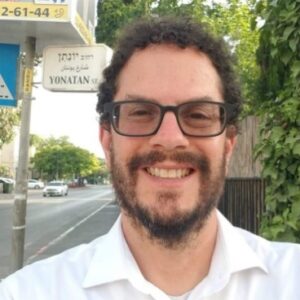The Shofar, Temple Beth El’s monthly publication, keeps community and temple members up to date on what’s going on. Take a look at this month’s Shofar to see what’s coming up or browse through the archives to see all that we’ve done!
| LETTER FROM |
| THE RABBI |
Partners in the Dream: A Jewish–Black Covenant for Justice
Dear Friends,
One of the most enduring images of the American civil rights movement is a photograph from Selma in 1965: Dr. Martin Luther King, Jr., marching arm in arm with Rabbi Abraham Joshua Heschel. Heschel later wrote that during that march, “I felt my legs were praying.” This was not poetic exaggeration after the fact; it reflected a genuine, ongoing relationship between Dr. King and the Jewish community, rooted in shared texts, shared trauma, and a shared moral vision. Dr. King regularly acknowledged that connection. He celebrated the shared suffering and ultimate vision of Jews and Blacks, noting that “My people were brought to America in chains. your people were driven here to escape the chains fashioned for them in Europe. our unity is born out of our common struggle for centuries, not only to rid
ourselves of bondage, but to make oppression of any people by others an impossibility” (address to the American Jewish Congress [AJC], May 14, 1958). He understood the Jewish experience of slavery, exile, and resilience as a living moral resource for the Black freedom struggle.
Lest we forget: The Black-Jewish partnership was not symbolic, it was the in-the-trench priority of our community: Jewish leaders and institutions provided critical financial, legal, and organizational support to the civil rights movement, from founding the NAACP and the Urban League together to marching together for a better world. AJC President Rabbi Joachim Prinz, a refugee from Nazi Germany, spoke immediately before Dr. King at the March on Washington in 1963, warning that “bigotry and hatred are not the most urgent problem. The most urgent problem is silence” (a full two decades before Auschwitz survivor Elie Wiesel taught us that “The opposite of love is not hate, it’s indifference”). Dr. King later called that moment one of the most powerful expressions of moral allyship he had ever
witnessed. The relationship was real, complex, and deeply principled—even when it was tested by political disagreements—because it was anchored in the belief that dignity is indivisible. Our tradition gives language to this idea. We learn:
“Therefore humanity was created from a single
person, to teach that anyone who destroys a single
life is as if they destroyed an entire world, and
anyone who saves a single life is as if they saved an
entire world” (Mishnah Sanhedrin 4:5).
The same passage goes on to explain diversity itself: God created all people from one human so that no one could say, “My ancestor is greater than yours,” and yet God made each face different, teaching that multiplicity is not a flaw in creation but its glory. Difference, in Jewish thought, is not a threat to unity—it is the very way unity becomes meaningful.
Dr. King echoed this idea in his own theological language, describing what he called the “beloved community,” a society in which difference is not erased but redeemed through justice and love (Stride Toward Freedom, 1958). Seen through Jewish eyes, this is not a foreign vision. It is a modern expression of klal Yisrael and tzelem Elohim—the radical claim that every human being bears God’s image, and that the world is only whole when those images stand together.
May we honor Dr. King’s legacy this month—and our own—by refusing silence, embracing diversity as sacred, and continuing the holy work of building a world that reflects the image of God in all its faces.
Rabbi Jonathan Klein
p.s. send me feedback via phone: 424.248.5775. Thank you!

SHOFAR ARCHIVES
| 2026 | 2025 | |
| January | January | |
| February | ||
| March | ||
| April | ||
| May | ||
| June | ||
| July | ||
| August | ||
| September | ||
| October | ||
| November | ||
| December |
